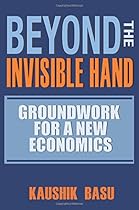Beyond the Invisible Hand: Groundwork for a New Economics

| Author | : | |
| Rating | : | 4.78 (938 Votes) |
| Asin | : | 0691173699 |
| Format Type | : | paperback |
| Number of Pages | : | 312 Pages |
| Publish Date | : | 2014-01-16 |
| Language | : | English |
DESCRIPTION:
Marks Professor of International Studies at Cornell University. He is currently chief economic advisor to the Ministry of Finance of the Government of India. Kaushik Basu is professor of economics and the C. . His books include Prelude to Political Economy: A Study of the Political and Soc
The author's contributions to political economy deserves to be taken seriously."--Jonathan Schlefer, Perspectives on Politics. It is a book worth reading by the socialist types who run our country, as well as those who need to understand socialism to dissent from it."--Business World"A very rewarding read. Homan, Bloomberg"A most interesting and a most significant book. He has done so without cluttering it up with Marxist jargon or abstract mathematics; the worst the reader will encounter in this book is game theory, which, though it is not all fun and games, is pretty easy to follow. Basu's latest book, subtitled Groundwork for a New Economics, aims to show that many economists have dogmatically accepted capitalist theori
In Beyond the Invisible Hand, Kaushik Basu argues that mainstream economics and its conservative popularizers have misrepresented Smith's insight and hampered our understanding of how economies function, why some economies fail and some succeed, and what the nature and role of state intervention might be. Comparing this view of the invisible hand with the vision described by Kafka--in which individuals pursuing their atomistic interests, devoid of moral compunction, end up creating a world that is mean and miserable--Basu argues for collective action and the need to shift our focus from the efficient society to one that is also fair. By scrutinizing Adam Smith's theory, this impassioned critique of contemporary mainstream economics debunks traditional beliefs regarding best economic practices, self-interest, and the social good.. Using analytic tools from mainstream economics, the book challenges some of the precepts and propositions of mainstream economics. One of the central tenets of mainstream economics is Adam Smith's proposition that, given certain conditions, self-interested behavior by individuals leads them to the social good, almost as if orchestrated
Thoughtful and penetrating synthesis of humanism and economic theory Herbert Gintis As Basu says in the final chapter of this thoughtful and penetrating volume, Beyond the Invisible Hand "tries to lay the groundwork for a manifesto, but cannot pass for one." Basu stands clearly and firmly in two traditions. The first is progressive humanism, for which the goal of social policy is to create conditions that promote the well-being and dignity of all morally worthy citizens of all countries. I am sure some will violently disagree with this goal, for instance asserting that the goal of social policy is protecting property and ensuring contracts, but I consider Basu's dream no more controversial than the goal of eliminati. "Maybe beyond, but not by far enough" according to A. J. Sutter. When she's feeling rebellious, one of my cats likes to sneak out the front door - but never more than about 1 meter past the threshold. This is admirable in a housecat, but less so in a heterodox economist. Like some of the most famous "heteros" - including Nobelists Amartya Sen and Joseph Stiglitz, both of whom contributed pre-publication blurbs (and perhaps also including Prof. Herb Gintis, whose advice is acknowledged in the preface to this book) - the author (KB) makes many reasonable and humane observations about society, and about the role that mainstream (neoclassical) economic theory has played in propagating injustice. But l. Does the Invisible Hand Always Lead Us to the Best Possible World? In 1759, Voltaire ridiculed Leibniz's contention that "all is for the best in the best of all possible worlds". If our universe is, in a restricted sense, the best possible one that a benevolent God could have created, how to account for the horrors of the Seven Years' War or the destruction of the 1755 Lisbon earthquake, which shocked Voltaire's contemporaries? Nowadays the market has supplanted God as the invisible architect, and the question of the best of all possible worlds is raised again. This time however, satire is being replaced by theoretical models, and Leibniz's Theodicy has been supplanted by economics or, more specific
